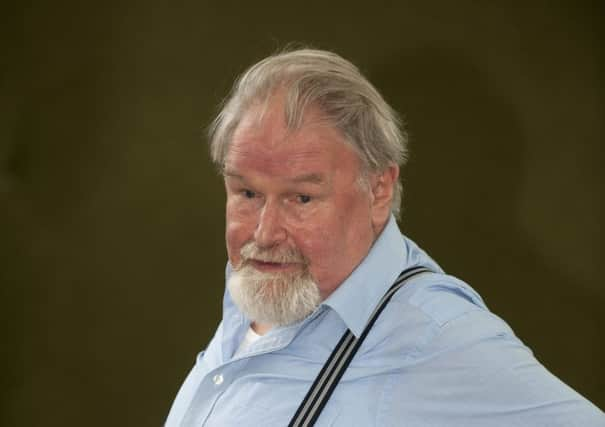Alasdair Gray paints bright picture of referendum


The veteran novelist and painter – one of the leading cultural voices backing the case for a Yes vote – said he had been left hopeful after reading official publicity material making the case for the Union.
Despite decades of support for independence, he hinted that he was not convinced Scotland would vote in favour of it in next month’s poll. But he predicted that increased support for Scotland going it alone in the vote would still be “a step nearer” to the ultimate goal.
Advertisement
Hide AdIn front of a packed audience at the Edinburgh International Book Festival yesterday, Gray also said he did not believe artists had any more right to be heard than “labourers or tradespeople”. Gray joked that he may vote in favour of the Union as a result of feeling “older, less vital and a bit more stupid”.
But he said he had been left “optimistic” about the result of the independence vote after reading publicity material by the Better Together campaign.
Gray added: “It was very interesting. It was indicating that there going to be fuller employment and more investment in business. I thought, ‘Surely this is not on the Conservative agenda?’
“A friend told me that the No campaign, having been criticised for having no positive ideas, is actually promising a greater degree of independence to the Scottish Parliament if we note No. I thought, ‘That’s wonderful – a small step forward’. I want a much bigger step forward, of course.
“There is certainly going to be a much bigger proportion for it [independence]. I hope it’s bigger enough to carry. But even if it doesn’t and the present government carries through its promises, it is still a step nearer to what I’d finally like to see.”
Advertisement
Hide AdIn response to a question from the audience about the contribution of artists to the debate, Gray added: “It is important everybody has a say in this conversation. Artists are no more important than labourers or tradesmen, skilled and unskilled.”
Meanwhile, Gray denied claims he is anti-English despite raising fresh concerns about who is being appointed to senior jobs in the arts in Scotland.
Advertisement
Hide AdGray attacked the “vast industry” of arts administrators in Scotland and the number of posts that were handed to “bankers and top businessmen”.
He said English administrators were preferred by arts organisations because Scottish artists were not trusted enough and even “actively disliked” by some arts bodies, but denied he had a hatred of the English, adding: “I don’t hate anybody.”
Gray sparked controversy in December 2012 after it emerged he had written an essay attacking the hiring of English “colonists” to influential and powerful positions in Scotland.
He singled out Vicky Featherstone, the departing artistic director of the National Theatre of Scotland, and Andrew Dixon, who resigned his post as Creative Scotland chief executive shortly before the essay was published. Both organisations looked south of the Border for their replacements – Laurie Sansom and Janet Archer respectively.
The Scottish Government is yet to begin the recruitment process for a new chair of Creative Scotland to replace Sir Sandy Crombie, the former Standard Life chief executive.
Gray said he believed modern Scotland was a much better place to be a working artist than when he was trying to forge a career, saying there was a failure of “confidence and nerve” in the country in the early part of the 20th century.
Advertisement
Hide AdBut he added: “Things have changed hugely. We now have a vast industry of Scottish arts administrators and of course they need a few artists. I’ve been accused of hating the English and I don’t. I don’t hate anybody. I’m just pointing out the people in important Scottish committees, by which I mean bankers and top businessmen.
“They prefer having English administrators in charge of Scottish arts. That’s why they chose an English person to be in charge of Creative Scotland.
Advertisement
Hide Ad“It’s the Scots who are to blame for the fact that they actually do distrust and possibly actively dislike quite a lot of them [artists].
“The idea of putting Scottish writers and painters in charge of their own institutions, it’s impossible.
“It would be as bad as having teachers in charge of schools – we can’t have that.”